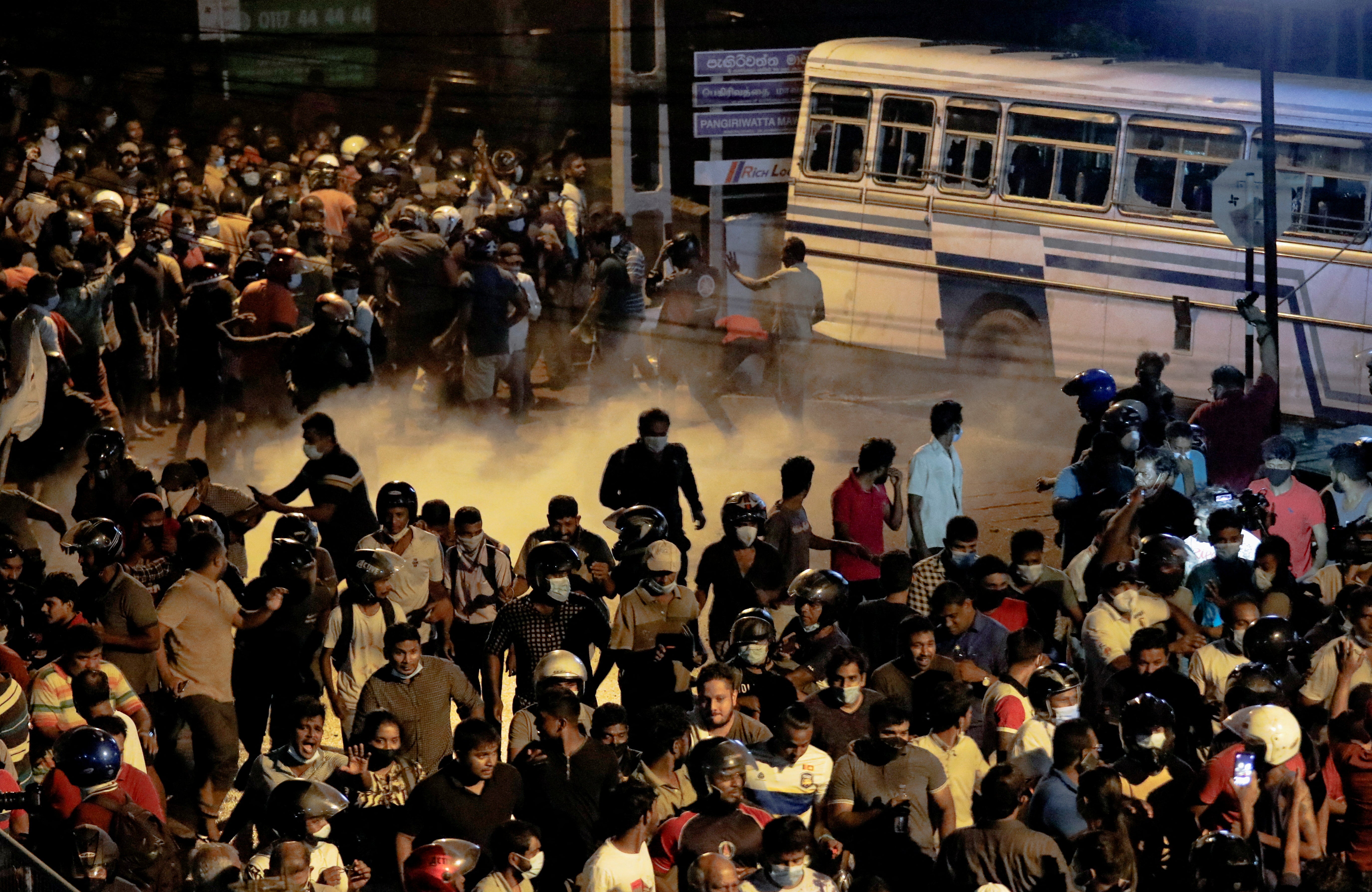Sri Lanka declares emergency and slaps curfew as president accuses protesters of creating ‘Arab Spring’
President Gotabaya Rajapaksa says in statement that protesters are trying to ‘create anarchy in the country’
Your support helps us to tell the story
From reproductive rights to climate change to Big Tech, The Independent is on the ground when the story is developing. Whether it's investigating the financials of Elon Musk's pro-Trump PAC or producing our latest documentary, 'The A Word', which shines a light on the American women fighting for reproductive rights, we know how important it is to parse out the facts from the messaging.
At such a critical moment in US history, we need reporters on the ground. Your donation allows us to keep sending journalists to speak to both sides of the story.
The Independent is trusted by Americans across the entire political spectrum. And unlike many other quality news outlets, we choose not to lock Americans out of our reporting and analysis with paywalls. We believe quality journalism should be available to everyone, paid for by those who can afford it.
Your support makes all the difference.Sri Lanka’s president, Gotabaya Rajapaksa, has declared a state of emergency and announced a curfew in the country after dubbing widespread angry protests to be the work of “organised extremists” trying to create an “Arab Spring”.
While the president announced the emergency on Friday, the Sri Lankan government said in a second announcement on Saturday that it will introduce a curfew from 6pm Saturday until 6am Monday.
“Under the powers given to the president curfew has been imposed countrywide from 6 p.m. on Saturday to 6 a.m. on Monday”, the government’s information department said.
The country has been facing large-scale protests in the backdrop of one of the worst economic crises in decades as people find it increasingly harder to get access to basic essentials and amenities.
The president’s office issued a statement on Friday branding several protesters “organised extremists” trying to “create anarchy in the country”, while Dilum Amunugama, a minister, sought to accuse several protesters of being “terrorists”.
The president’s Friday statement also said protesters were trying to create an “Arab Spring” in the country.

At least 53 people were arrested in capital Colombo on Friday after hundreds of protesters had attempted to storm Mr Rajapaksa’s private residence, angry at the shortage of basic commodities, leading to at least 50 injuries.
The Arab Spring was a series of anti-government protests and uprisings that had spread across the Middle East and north Africa in the last decade as a response to corruption and economic stagnation.
The president’s office said Mr Rajapaksa took the decision “in the interests of public security, the protection of public order and the maintenance of supplies and essential services.”
In the course of overnight protests in Colombo, a mob of hundreds of people demanded Mr Rajapaksa and his cabinet resign, shouting “go home, Gota go home”. Several protesters stormed through barricades in Mirihana on the outskirts of Colombo.
Police fired teargas and water cannons as they tried to disperse the protesters, who were accused by authorities of arson and stone pelting, pushing through the first line of barricades blocking the road to Mr Rajapaksa’s home.
Earlier reports stated Mr Rajapaksa was not at home at the time. Sri Lanka’s health minister, however, said Mr Rajapaksa and his wife were present at the time of the protests and said it was “a major intelligence failure”.
“We had information of a demonstration, but nothing suggesting that it could turn violent. This is a major intelligence failure”, he was quoted as saying by news agency AFP.
Indian news channel NDTV reported that a ship carrying 40,000 tonnes of diesel under a $1bn (£762m) credit line given to Sri Lanka by India reached the country on Saturday morning.
The fuel will be distributed across the country this evening.
Underscoring the extent of the crisis, a vessel with 5,500 tonnes of cooking gas had to leave Sri Lankan waters after Laugfs Gas, the country’s second largest supplier that had ordered it, failed to get $4.9m (£3.7m) from local banks to pay for it, reported Reuters.
“People are struggling with an acute shortage of cooking gas, but how can we help them when there are no dollars? We are stuck”, Laugfs Gas Chairman WHK Wegapitiya told the French news agency.
Shops have opened in Colombo on Saturday amid tight security.
“Sri Lankans have a right to protest peacefully – essential for democratic expression”, said Julie Chung, the US’s envoy to Sri Lanka.
“I am watching the situation closely, and hope the coming days bring restraint from all sides, as well as much needed economic stability and relief for those suffering”, she tweeted.
Earlier this week, Sri Lankans were informed to brace for 13-hour blackouts as the government on Thursday said power cuts were expected to continue till May. Two weeks earlier, the country had run out of printing paper, leading to the cancellation of several school exams.
Additional reporting by agencies
Join our commenting forum
Join thought-provoking conversations, follow other Independent readers and see their replies
0Comments